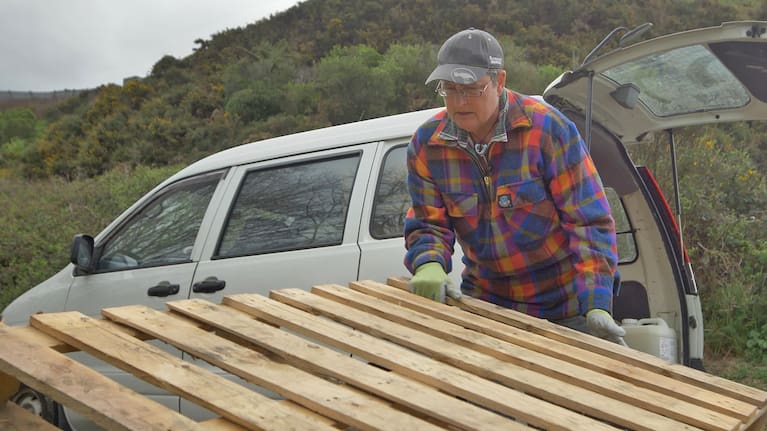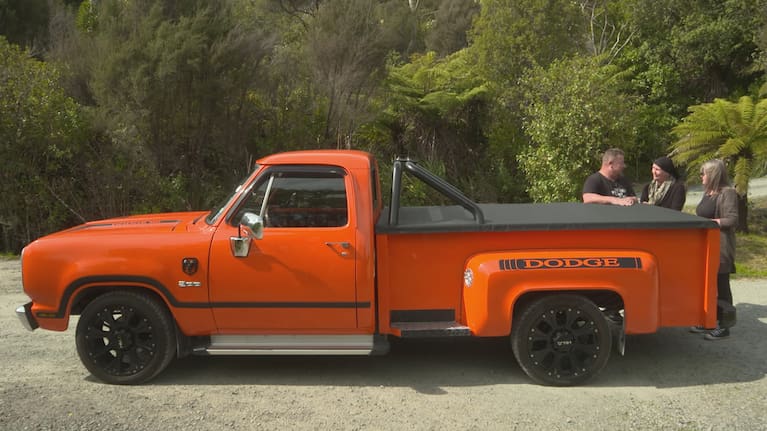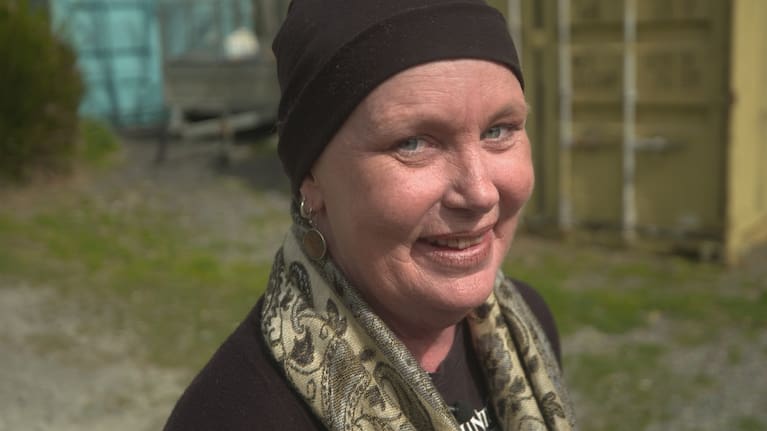While New Zealand grapples with a cost-of-living crisis, the cost of dying is increasingly unaffordable. In a bid to say goodbye without emptying the bank, some Kiwis are turning to DIY funerals. Karen Edser is one of them.
In April, Karen Edser wasn’t feeling like herself. Her balance was off, her peripheral vision was blurry, and she’d suddenly lost the ability to reverse the car.
Doctors sent the 51-year-old in for tests. The results were devastating. Metastatic melanoma had left her with cancerous tumours in her brain and the diagnosis was terminal.
“It’s been a roller-coaster,” says Karen. “It hits you straight away, knowing that mortality has kicked in.”
The mother-of-two is a caregiver for the elderly but is now adjusting to being the one who needs caring for. Her older sister Jo-Anne Edser is by her side.
“She’s going to leave a f**** huge hole. I don’t even want to picture life without her, but we've all had to start doing that,” says Jo-Anne.
She says picturing life without Karen means thinking about her funeral. It’s a difficult, but important conversation.
“What do you actually want? What do you want it to look like? Because we don't talk about it, people just go crazy on funerals.”
In a bid to say goodbye without emptying the bank, some Kiwis are turning to DIY funerals. (Source: Sunday)
The costs
Dying is expensive. On average, New Zealanders spend $10,000 on a funeral.
There are some costs that are unavoidable and others that vary widely depending on location.
For example, on Auckland’s North Shore you’ll pay at least $6100 for a cemetery plot and burial compared to $2200 in Invercargill. Cremation is generally cheaper and more popular in New Zealand.
Other costs like venue hire, catering, embalming, transportation and flowers can add up to thousands quickly.
On top of all that, there’s “professional service” — a catch-all fee charged by funeral directors. The exact amount depends on which funeral home you use but generally it ranges from $2000 to $5000.
Funeral Directors Association president Rachel Benns says funeral homes are a 24/7 operation. Professional service fees cover the operating costs, arranging the funeral, and organising legal documents.
She doesn’t believe funerals are too expensive and says families can choose whether they go into debt.
“There are families who want the best of everything, that want to do the right thing and are comfortable to pay that off over time, put it on the credit card, or go to a finance company.”
At the moment, WINZ offers a means-tested funeral grant of up to $2450, but Benns says it’s not enough to cover even a basic cremation.
“If it did cover the cost, there would be funeral homes popping up that would just specialise in WINZ grant funerals. There is not one funeral home that that's all they do,” she says.
The Funeral Directors Association is calling on the Government to increase the grant to $7000 for low-income families.
“I'm not saying that we should increase it to the point where it's going to be a lavish affair, but everybody should have the opportunity to be able to come to the funeral home and say goodbye.”
Benns said funerals are important for a “healthy grieving process” and funeral directors play an important role in allowing that to happen.
“When someone dies, you want to be with your family. You want to be able to spend that time grieving and not running around trying to find the lilies from the grower or worrying about what paper you're going get for the service sheet.”
Doing it yourself
As well as the costs of a funeral, Edser is juggling huge medical bills. She’s just started a course of cancer drugs that aren’t funded in New Zealand.
“It's about $10,000 a month. It’s a lot but for the family you’ve got to throw everything at it,” she says.
Edser wants to leave any money left over to her kids, and she refuses to let anyone go into debt to pay for her send-off.
“That just honours the banks, doesn't it? That’s abhorrent.”
She’s seeking help from her friend Frances Potter, a DIY funeral expert.
Potter runs a website to help people who want to plan and carry out their own funerals. She also makes budget coffins in her home workshop.
“I was raised very frugally by wartime generation parents. We didn't waste anything, and I had to learn how to do things myself,” she says.

Three years ago, when her mother passed away, Potter was shocked by the prices charged by funeral directors.
“They are profit-based businesses, there's no question. They offer a service that some people need, but there's plenty of money being made in it and it shouldn't be that way.”
Potter makes her coffins out of discarded pallets she collects from roadsides. So far, she’s sold about a dozen caskets.
“I’m not making a living, it's more of a hobby. It gives people a way to get one if they can't make it themselves.”
Edser plans to pay $400 for her casket. It’s a huge saving compared to the $1900 coffin she was offered by the funeral home.
She’s skipping the hearse and instead will be driven to the crematorium in the back of a friend's Dodge truck, a nod to her love of drag racing.

Her older sister Jo-Anne said: “People can spend hundreds on a spray of flowers for the top of the coffin. Karen would appreciate somebody coming along with a flower that was growing in the garden or a stone that they'd picked up from the beach.”
She is planning a service at home after her sister's cremation where friends can gather to celebrate Edser’s life.
However, if loved ones need to travel from out of town for the funeral, the sisters would both rather they spent that money on coming to see Edser while she is still here.
“Using the money that you do have to actually enjoy what life you have left, that's really important. Focusing on living rather than dying,” says Jo-Anne.



















SHARE ME